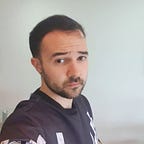My Body And I
Looking at myself in the mirror, I cringe. Looking back is a man of average height and build. His slightly rounded face is accentuated by a dark beard, and his brown eyes are repeatedly darting between looking into the mirror and looking at the ground. In the mirror I see a monster, someone who surely cannot be loved.
My relationship with my body has always been uncomfortable. From a young age I compared myself to others — he’s skinnier than me, he’s taller than me, she’s got nicer eyes than me — and those contrasts became the way I saw my ideal body. Their height, their build, their face; that’s what I want.
This toxic relationship only worsened as I grew older, and it wormed its way into other aspects of my life. I became envious of friends, equating their success in life (including their love lives) with attractiveness. I pushed myself away from relationships as I deemed myself unworthy, whilst simultaneously believing others were unattracted to me. I developed an intense dislike towards attractive people, wrongly imagining they coasted by on good looks. Unpacking and reducing these negative beliefs, which were deeply rooted in my mind, took a lot of hard work.
As I explored my sexuality, I felt uncomfortable within LGBTQ+ spaces. The people who got the most attention were tall and muscular with striking good looks, a far cry from how I felt about myself. I would be critiqued on my appearance (“You’d be better looking if you lost a little bit of chub” or “I’d date you if you were a bit more attractive”) and I would try my best to fit other people’s ideals. Scrolling through social media platforms (especially Twitter) meant seeing pictures of beautiful queer bodies and handsome faces with thousands of likes, and I believed that was the only way to be noticed. It took a lot of hard work to reject the idea that queer men had to look a certain way, and I became more accepting of myself. It also made me recognise that other people, no matter how “attractive”, felt the same way; sharing these photos can be a way to feel comfortable about yourself.
My belief that I was ugly manifested itself into a drive to excel in every other area. In my eyes, I had to be perfect at everything I did. I threw myself into my career, believing I had to work as much as possible to get the same attention as my more attractive peers. In my personal life, I tried to develop as many skills as possible. I took up running. I exercised regularly. I developed my cooking and baking skills. I turned writing into a career opportunity. I took up yoga and began meditating. I made a hobby out of photography and video creation. These were all things I wanted to do, but I believed that these skills made up for my appearance.
When you lack confidence in the way you look, your personality changes. You may shy away from social situations and become reserved, developing a distrust in others. Alternatively, you may accentuate some of your other qualities such as your humour or your kindness. For me, it meant a distinct scattering of my identity; I had no idea who I was. I struggled to define myself because I felt I was adapting to whatever people liked about me the best. I acted more over-the-top around certain people, or chill and laid-back with others. My friends and family may have found ways to describe me, but I couldn’t.
At 27, there’s still many struggles. Some days, I can’t bear to look at myself in the mirror. I feel uncomfortable when people talk about attractiveness or physical appearance, and I still have moments where I want to completely overhaul myself. Some of that envy towards attractiveness still lingers, but less so. In a lot of ways, things have gotten easier. I feel more comfortable taking photos of myself, and I can often look in a mirror and feel good. Self-love is a lifelong journey, and I know my happiness with my appearance will continue to grow.
I recognise that beauty is in the eye of the beholder, and there’s people out there who would consider me attractive. I also recognise that people I see as beautiful may have these same feelings of self-loathing. As long as I can be happy with who I am — my personality, my interests, my individualism — then why obsess over appearance as a single defining characteristic? I’ve learned to style myself in a way that makes me happy and says who I am. I recognise that my progress come from hard work and perseverance, and I shouldn’t compare myself to others. There’s no doubt I’ll have days where I feel bad about the way I look, but working on my own self-worth is worth it.
Originally published at https://www.alexlduffy.com on August 2, 2020.
